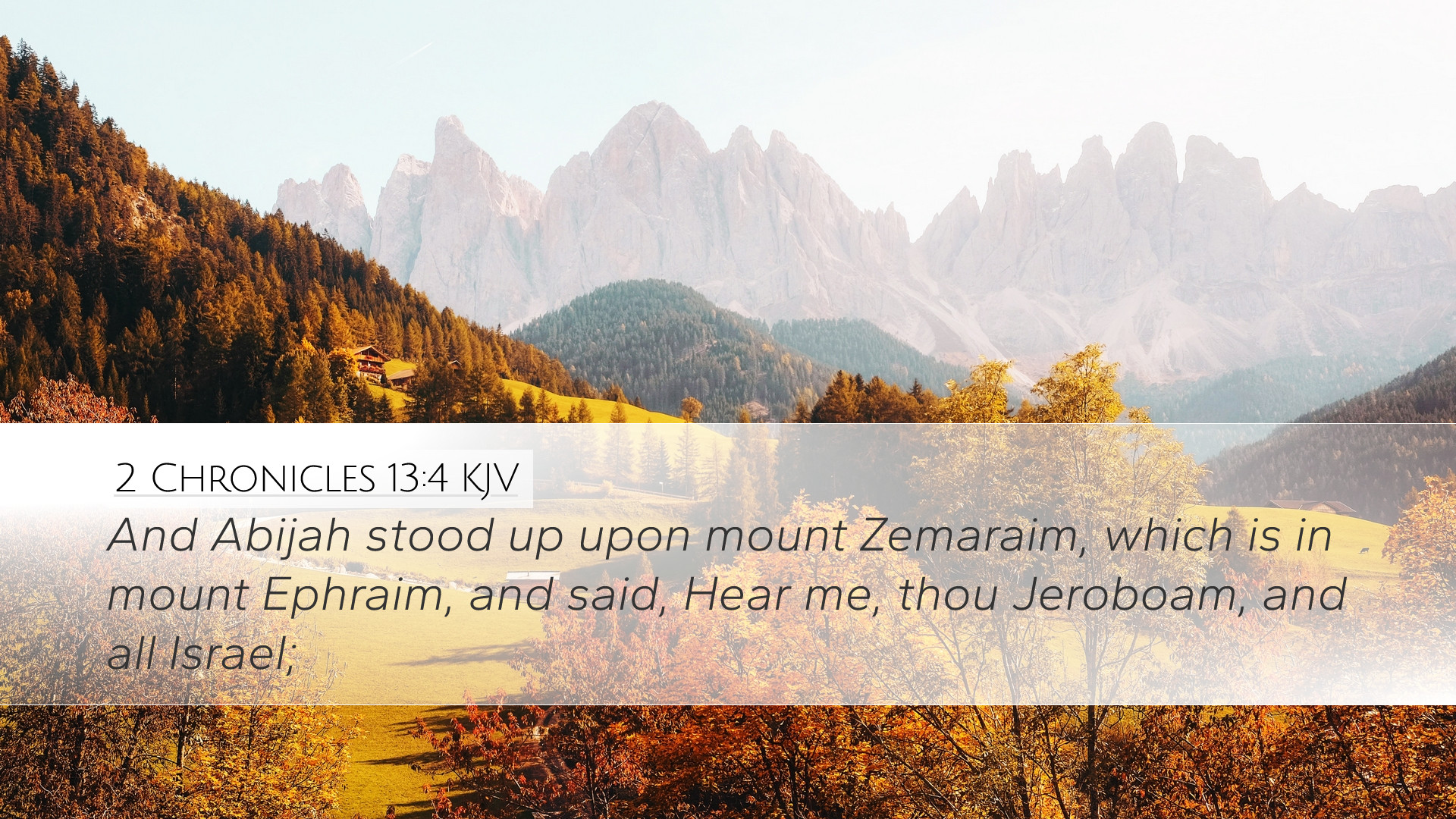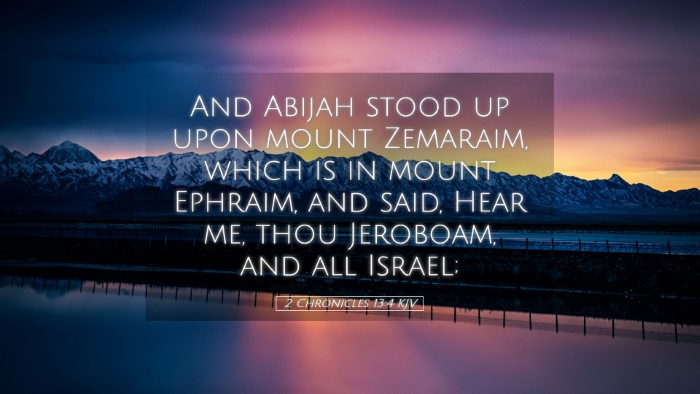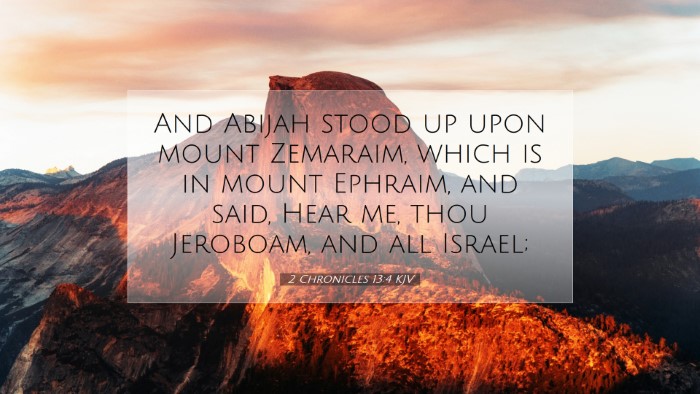Commentary on 2 Chronicles 13:4
2 Chronicles 13:4 states:
"And Abijah stood up upon mount Zemaraim, which is in the mount Ephraim, and said, Hear me, thou Jeroboam, and all Israel." (KJV)
Introduction
This passage marks a pivotal moment in the history of Israel during the reign of Abijah, who becomes king of Judah and confronts Jeroboam of Israel. This confrontation arises from the divided kingdom that followed Solomon's death, bringing into focus themes of legitimacy, loyalty, and divine favor.
Historical Context
The division of the kingdom into Judah and Israel has profound implications for the spiritual and political landscape of the ancient Near East. The main players in this narrative, Abijah and Jeroboam, represent contrasting approaches to worship and leadership.
- Abijah's Position: As a descendant of David, Abijah claims the divine promise to David's lineage, thereby asserting his rightful claim over the kingdom of Judah.
- Jeroboam's Rule: Once a servant of Solomon, Jeroboam leads Israel into idolatry, setting up golden calves in Bethel and Dan to divert his subjects from Jerusalem's legitimate worship.
Interpretations from Public Domain Commentaries
Matthew Henry's Commentary
Matthew Henry elaborates on Abijah's speech, emphasizing the significance of his position on mount Zemaraim, a symbolic place that serves to remind the Israelites of their covenant with God. Henry points out that Abijah’s boldness is rooted in God's promises to David’s house and that this moment is not just political, but deeply spiritual.
Henry highlights Abijah's challenge to Jeroboam, stressing that he seeks to awaken Israel to the reality of their forsaken covenant: "It is evident, that they had departed from the true worship of God, and Abijah calls them back to repentance." The call to “hear” indicates Abijah’s intention to communicate a divine message rather than merely a personal or political one.
Albert Barnes' Notes on the Bible
Albert Barnes adds depth to our understanding of the geographical significance of mount Zemaraim, noting it’s situated strategically in the territory of Ephraim. This location serves not only to elevate Abijah's message but to symbolize Judah's claim over Israel in terms of rightful leadership and worship. Barnes explains that the phrase “Hear me” is a passionate appeal, indicating Abijah's desire to reclaim the hearts of the people and remind them of their spiritual heritage.
Barnes also discusses the implications of Abijah’s appeal to remember the covenant made with David, positioning Abijah as not only a king but as a spiritual leader intent on guiding his people back to their godly heritage.
Adam Clarke's Commentary
Adam Clarke provides a critical viewpoint on Abijah's approach, suggesting that while Abijah had good intentions, his own lifestyle may not have fully aligned with the righteousness that he calls for among the people. Clarke recognizes that Abijah’s lineage gives him a claim to authority, yet he also reflects on the complexity of leadership when one's actions do not entirely mirror one’s words.
Clarke highlights the irony of the confrontation, noting the ongoing tension between commitment to God and the allure of idolatry as exemplified by Jeroboam's Israel, suggesting that true reconciliation with God is more than a return to ancient promises; it requires an actual turning of the heart towards genuine worship.
Lessons for Pastors, Students, and Theologians
The narrative in 2 Chronicles 13:4 holds critical lessons that extend beyond its immediate context:
- The Role of Leadership: Leaders are called to inspire and summon their communities towards true worship. Abijah’s attempt to call Israel back to God illustrates the responsibility leaders bear for the spiritual state of their people.
- Divine Covenant: The importance of recognizing and remembering the covenant relationship between God and His people is paramount. This serves as a reminder for modern believers of the profound responsibilities tied to faith heritage.
- Spiritual Vigilance: The ongoing battle against idolatry, whether literal or metaphorical, remains relevant today. It encourages contemporary believers to examine what ‘golden calves’ they may be tempted to worship instead of God.
Conclusion
The passage in 2 Chronicles 13:4 provides a rich tapestry woven with themes of leadership, covenant, and the eternal struggle for fidelity to God. As Abijah stands on mount Zemaraim, he not only addresses Jeroboam but also the collective heart of Israel, urging a return to the foundational truths of their faith. The insights provided by public domain commentaries compel modern readers, especially pastors, students, and theologians, to reflect deeply on their own commitments to God amidst a world that often pulls away from true worship.


